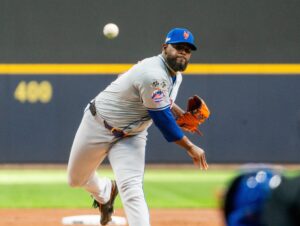Welcome to Week 11 of Ejection Inspection! The premise and ground rules are detailed here. The condensed version: each ejection from the previous week (Thursday through Wednesday) is listed in a table. The author – a former player/coach/umpire – analyzes each ejection and assigns it an entertainment rating of one to five Weavers in honor of late Baltimore Orioles manager Earl Weaver. This week’s focus is Jeremie Rehak.
(For a list of every article in this series, click here.)
There were 12 ejections in Week 11 – the second highest of the season. Three players were ejected along with one hitting coach and eight managers.
| Date | Team | Opp | Inn. | Name | Pos | Umpire | Pos | Reason | ||
| 1 | Fri | 6/7 | DET | MIN | T3 | Ron Gardenhire | Mgr | James Hoye | HP | Arguing a balk call |
| 2 | Sat | 6/8 | KC | CWS | B6 | Ned Yost | Mgr | Bruce Dreckman | HP | Arguing balls/strikes |
| 3 | Sat | 6/8 | NYM | COL | B5 | Mickey Callaway | Mgr | Mike Winters | HP | Arguing balls/strikes |
| 4 | Sun | 6/9 | LAA | SEA | B4 | Brad Ausmus | Mgr | Jeremie Rehak | HP | Arguing balls/strikes |
| 5 | Mon | 6/10 | ATL | PIT | B1 | Josh Donaldson | 3B | Brian Gorman | HP | Yelling at pitcher after being hit |
| 6 | Mon | 6/10 | PIT | @ATL | B1 | Joe Musgrove | P | Brian Gorman | HP | Yelling at batter he had just hit |
| 7 | Mon | 6/10 | PIT | @ATL | B1 | Clint Hurdle | Mgr | Brian Gorman | HP | Arguing ejection of his pitcher |
| 8 | Tue | 6/11 | BOS | TEX | B5 | Andrew Benintendi | CF | Vic Carapazza | 1B | Insulting/abusive language |
| 9 | Tue | 6/11 | BOS | TEX | B5 | Alex Cora | Mgr | Vic Carapazza | 1B | Arguing Benintendi ejection |
| 10 | Tue | 6/11 | TEX | @BOS | T6 | Chris Woodward | Mgr | Angel Hernandez | HP | Persistent arguing after being told to stop |
| 11 | Wed | 6/12 | OAK | @TB | B3 | Bob Melvin | Mgr | Sean Barber | HP | Arguing balls/strikes |
| 12 | Wed | 6/12 | CIN | @CLE | T2 | Turner Ward | HtC | Lance Barrett | HP | Arguing balls/strikes from dugout |
A Correction
(Author’s Note: Somehow, I missed an ejection. On May 28, Oakland Athletics pitcher Joakim Soria was ejected by plate umpire James Hoye in the top of the ninth of the Los Angeles Angels’ 6-4 victory in Oakland. With two out and runners on second and third, Hoye called a 1-2 curveball from Soria a ball. This angered Soria, since the pitch was in the strike zone over the outer half of the plate. The next pitch was crushed for a two-run double that gave the Angels their fifth and sixth runs. After retiring the next hitter, Soria approached Hoye and loudly told him that he had “cost (him) two runs.” Hoye ejected him. I understood Soria’s frustration. Few wouldn’t. His ejection was technically justified, although it appeared to be a quick trigger. It received One Weaver, since Soria didn’t say much after being run.
Last Word on Baseball and I regret the erroneous omission from the earlier column.)
Ron Gardenhire, Detroit Tigers Manager
When
Friday, June 7, vs. Minnesota Twins, top of the third
Umpire
James Hoye (HP)
Description
While Twins center fielder Byron Buxton was on first, Tigers left-handed pitcher Matthew Boyd balked on an attempted pickoff throw. When he stepped to throw, he stepped more toward home than to first. Gardenhire argued the call, insisting that the first base umpire should have made the call instead of Hoye. After being told to end the conversation, Gardenhire continued, so Hoye booted him.
Understand the frustration?
Coaches and managers are always upset when their pitchers are called for a balk, regardless of the accuracy of the call, so yes.
Something Gardenhire didn’t seem to understand is that on the 45-degree-angle call during the pitcher move to first, it is often easier for the plate umpire to call it. The first base umpire can be too focused on judging safe/out at first to notice the legality of the move. The plate umpire, however, is never looking at first, and he can answer the 45-degree-angle question based on how much space is visible between the pitcher’s legs when he steps to throw the ball.
Was the ejection justified?
Yes. Gardenhire continued after he was told to stop. One question, though – was this really worth getting tossed? It was a balk call in the top of the third of a 1-0 game that moved a runner from first to second.
Entertainment Rating
One Weaver. Gardenhire argued emphatically and pointed a lot, but nothing else.
Ned Yost, Kansas City Royals Manager
When
Saturday, June 8th, vs. Chicago White Sox, bottom of the sixth
Umpire
Bruce Dreckman (HP)
Description
With the host Royals trailing the White Sox 2-0, left fielder Alex Gordon took the opening pitch from Lucas Giolito for a strike. The pitch appeared to be slightly below the zone. The crowd grew hostile on the call, and the Royals dugout started barking protests. Dreckman told the dugout to stop. Yost continued to complain, and Dreckman threw him out. Yost then came out of the dugout and continued to yell at Dreckman before heading to the clubhouse.
Understand the frustration?
Yes. The Royals were not playing well and haven’t all year. They had struck out 11 times in this game, with five coming on a called third strike. Dreckman had worked a low zone all game. Yost was trying to fire up the team and the crowd. It all was the perfect recipe for an ejection.
Was the ejection justified?
Yes. Not only did Yost argue balls and strikes, but he continued after Dreckman had told him to stop.
Entertainment Rating
Two Weavers. Yost’s angry rant riled up the crowd, earning him a bonus point.
Mickey Callaway, New York Mets manager
When
Saturday, June 8th, vs. Colorado Rockies, bottom of the fifth
Umpire
Mike Winters (HP)
Description
With the game tied at three, Mets first baseman Dominic Smith took two strikes that were in the lower end of the zone. The Mets dugout howled after both pitches. After the second one, Winters chucked Callaway from the game. Callaway emerged from the dugout and aired his list of grievances to Winters. After about 30 seconds, he headed to the clubhouse.
Understand the frustration?
Yes. Although these two pitches were strikes, Callaway was upset about several pitches from earlier in the game. Winters’ zone had been shaky all night.
Was the ejection justified?
Yes, since the rules specify that arguing balls and strikes warrants an ejection.
Entertainment Rating
One Weaver. This discussion was unremarkable.
Brad Ausmus, Los Angeles Angels manager
When
Sunday, June 9th, vs. Seattle Mariners, between third and fourth innings
Umpire
Jeremie Rehak (HP)
Description
In the bottom of the third, Angels center fielder Mike Trout came to the plate immediately after third baseman Tommy La Stella had homered to cut the Mariners lead to 2-1. The first two pitches were balls. The third pitch was high but called a strike anyway, as was the fourth. With the count now 2-2, Trout took a pitch that was at least eight inches wide of the plate. Rehak called it strike three, ending the inning.
Between the top and bottom of the fourth, Ausmus came out of the dugout to talk to Rehak. He had his mouth covered the entire time. Mid-conversation, Rehak sent Ausmus to the showers.
Understand the frustration?
Yes. All three of those pitches should have been called balls. Furthermore, Rehak’s strike zone has irritated teams all season long. There are times that his zone seems to be defined as “nose to toes and if the catcher catches it.” This was Rehak’s fourth ejection of the season – all while he was behind the plate. Every single one came from a team complaining about his zone.
Was the ejection justified?
Technically, yes, but Ausmus was so low-key and quiet about it that Rehak ended up looking like a power-hungry bully.
Entertainment Rating
Zero Weavers. This may have been the quietest ejection of the season.
Josh Donaldson, Atlanta Braves third baseman
Joe Musgrove, Pittsburgh Pirates pitcher
Clint Hurdle, Pittsburgh Pirates manager
When
Monday, June 10th, Pittsburgh Pirates at Atlanta Braves, bottom of the first
Umpire
Brian Gorman (HP)
Description
In the bottom of the first, with a runner on third and two out, Josh Donaldson’s jersey was grazed by a first-pitch fastball. As he started to first, he gave Musgrove an annoyed look. Musgrove caught the throw from the catcher and looked back at Donaldson, who asked (with profanity) what Musgrove was looking at. Musgrove asked why Donaldson was looking at him (also with profanity). Donaldson started toward Musgrove while continuing to ask what he was looking at. Catcher Elias Diaz tried to restrain Donaldson, who shoved him aside. By now, everyone on the field had gathered around the two, emptying both benches and both bullpens. Musgrove threw his hat down as his teammates pushed him away.
After order was restored, both Donaldson and Musgrove were thrown out of the game. Hurdle, livid, asked Gorman how he could throw Musgrove out. Gorman replied, “Because he instigated and stepped to him and left us no choice.” Hurdle continued to tell Gorman what he thought of the decision, and after several (mostly profane) words was also kicked out of the game.
Understand the frustration?
Every manager in the league would have been thrown out over this. It was the bottom of the first inning. The Pirates’ bullpen was going to be heavily taxed as a result.
Was the ejection justified?
By the book, yes, but despite the language used, this was a weak series of ejections. It was especially hard on the Pirates. They lost their starting pitcher. The Braves lost a guy who had been in a massive slump, hitting .105 in the previous 10 games. His ejection may have done them a favor.
Entertainment Rating
The Donaldson-Musgrove altercation received Four Weavers. It was fun to watch despite being so ridiculous. Hurdle’s ejection received Two Weavers. He certainly could have become more steamed over it. His head didn’t even turn red.
Andrew Benintendi, Boston Red Sox center fielder
Alex Cora, Boston Red Sox manager
Chris Woodward, Texas Rangers manager
These have received their own column. View it here. On a side note, these were the first ejections of the season for both teams. The Tampa Bay Rays are now the only team left without an ejection for the season.
Bob Melvin, Oakland Athletics manager
When
Wednesday, June 12, at Tampa Bay Rays, bottom of the third
Umpire
Sean Barber (HP)
Description
With two on, no one out, and a 1-0 count to Rays DH Austin Meadows, Barber called a curveball from Brett Anderson a ball. It was above the knees when it crossed the plate but appeared to break just wide before crossing the plate. Melvin loudly argued it from the dugout. Barber took his mask off and told Melvin to stop. Melvin did not, and Barber tossed him.
Melvin ran on the field and yelled his complaints. Among the things he said was that Barber had “missed five balls down the middle” from Anderson. Before Melvin quit speaking his mind, Barber nodded as if to say, “Okay. I hear ya. You’re still gone.”
Understand the frustration?
Yes. Barber had been calling a low zone all game. He rang up Olson to end the top of the third on a pitch that was six inches below the knees. Melvin can’t see inside/outside from the dugout, but he can see high/low. The two pitches immediately preceding the ejection were closer to the zone than the final pitch of the third inning.
Was the ejection justified?
Yes, since Melvin was arguing balls and strikes.
Entertainment Rating
Three Weavers. When Melvin gets ejected, he lets the umpire have it in an animated fashion but rarely reaches the level of Lou Piniella. This was no exception.
Turner Ward, Cincinnati Reds hitting coach
When
Wednesday, June 12th, at Cleveland Indians, top of the second
Umpire
Lance Barrett (HP)
Description
Cincinnati shortstop Jose Iglesias batted with one out and nobody on in the top of the second. On 0-1, he took a pitch near the knees for strike two. The Reds felt it was low, and it might have been, but it was so close that it realistically could have been a strike. Two pitches later, Iglesias took strike three, which appeared to be four to six inches below the knees. The Reds dugout howled. Barrett yelled for them to stop then threw Ward out of the game.
Bell came onto the field and had a calm discussion with Barrett that drug on and on. After the crowd grew hostile and crew chief Mike Everitt intervened, Bell left the field without further incident.
Understand the frustration?
Yes, since the last pitch appeared to be low.
Was the ejection justified?
Yes. Not only was Ward arguing balls and strikes, but Barrett had told him twice to stop.
Entertainment Rating
Zero Weavers. The ejection was low-profile, and Bell’s subsequent grievance session was so long that it got annoying.
Leaderboard
After 11 weeks, here are the leaders. Fight-related ejections are not counted toward the leaderboard.
Individual: Detroit Tigers manager Ron Gardenhire (four)
Team (excluding fights): Cincinnati Reds (seven). Second place: Two-way tie between the Kansas City Royals and Oakland Athletics (six each). Of note, each of these teams had one ejection this week.
Umpire (excluding fights): Mike Estabrook (six)
Look for Week 12 on Thursday, June 20th.
Evan Thompson played baseball as a youth and teenager. He also umpired between 1995 and 2004 and has coached at the high school level.
Main Photo
Embed from Getty Images






